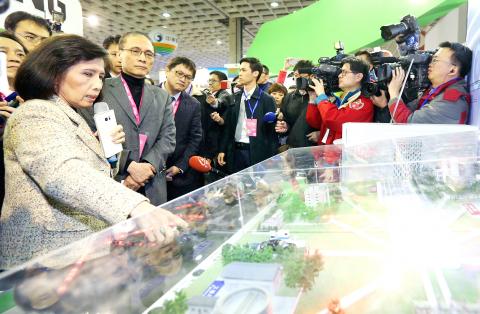Premier-designate Lin Chuan (林全) yesterday said he would move “proactively” to review current industrial policies to help develop the Internet of Things (IoT) and “smart city” projects in Taiwan after the Democratic Progressive Party administration takes office on May 20.
“We view the IoT field as an important economic growth driver for the nation… We think Taiwan needs new industry to create more job opportunities and business potential,” Lin told reporters after visiting the Smart City Summit and Expo at the Nangang Exhibition Hall in Taipei.
Lin said that IoT might be the next Industrial Revolution and Taiwan cannot miss the opportunity the industry promises when Taiwanese companies have the technologies and resources available.

Photo: CNA
He also said new industry has more potential than existing industries when it comes to offering new job opportunities and higher wages.
“The government should support the development of a new industry,” Lin said. “We hope to see certain positive results regarding the progress of smart city and the IoT industry during a short period of time.”
Taipei Computer Association chairman Tung Tzu-hsien (童子賢), who accompanied Lin on his visit the exhibition, said he thinks a smart-city project could not be built without government help.
“Without the government’s assistance, such as offering locations for smart-solutions trials, the manufacturers could not test their smart-city applications,” Tung said.
Tung said former US president Bill Clinton’s administration formed a high-ranking special office to listen to the opinions of those in Silicon Valley, California, and then amended policies in a bid help US companies amid the rising Internet industry.
“In addition to companies’ private efforts, it is also important to have top-down aid from the government,” he said.
“If the government’s policies and budget allocation could meet the demands of the IoT industry, I believe Taiwanese companies could continue to walk ahead of the world, like we did in the PC era,” Tung said.
An executive at Asus Cloud Corp (華碩雲端) shared a similar view, saying that the key to helping companies seize business opportunities in smart-city programs worldwide would depend on government support in building a smarter, safer and more convenient living environment.
“Smart city can not work without local government help with open data, setting up friendly policies and providing locations for smart-solutions trials,” Asus Cloud global business center specialist Sean Chen (陳逸軒) told the Taipei Times at the expo.
Chen said Asus, Realtek Semiconductor Corp (瑞昱), Academia Sinca and the Taipei City Government jointly launched an “Air Box PM2.5” project on Tuesday, installing a total of 300 devices to monitor airborne particles measuring 2.5 micrometers or less in the city to collect air quality data.
The city government offered locations for the project and Realtek provided the hardware, while Asus’ cloud-computing platform allows data to be stored and retrieved, he said.
“The Taipei City Government installed 150 Air Boxes in 150 elementary schools in just two days… This could have taken months if not for local government assistance,” Asus chief executive officer Peter Wu (吳漢章) said.

Taiwan Semiconductor Manufacturing Co (TSMC, 台積電) last week recorded an increase in the number of shareholders to the highest in almost eight months, despite its share price falling 3.38 percent from the previous week, Taiwan Stock Exchange data released on Saturday showed. As of Friday, TSMC had 1.88 million shareholders, the most since the week of April 25 and an increase of 31,870 from the previous week, the data showed. The number of shareholders jumped despite a drop of NT$50 (US$1.59), or 3.38 percent, in TSMC’s share price from a week earlier to NT$1,430, as investors took profits from their earlier gains

In a high-security Shenzhen laboratory, Chinese scientists have built what Washington has spent years trying to prevent: a prototype of a machine capable of producing the cutting-edge semiconductor chips that power artificial intelligence (AI), smartphones and weapons central to Western military dominance, Reuters has learned. Completed early this year and undergoing testing, the prototype fills nearly an entire factory floor. It was built by a team of former engineers from Dutch semiconductor giant ASML who reverse-engineered the company’s extreme ultraviolet lithography (EUV) machines, according to two people with knowledge of the project. EUV machines sit at the heart of a technological Cold

Taiwan’s long-term economic competitiveness will hinge not only on national champions like Taiwan Semiconductor Manufacturing Co. (TSMC, 台積電) but also on the widespread adoption of artificial intelligence (AI) and other emerging technologies, a US-based scholar has said. At a lecture in Taipei on Tuesday, Jeffrey Ding, assistant professor of political science at the George Washington University and author of "Technology and the Rise of Great Powers," argued that historical experience shows that general-purpose technologies (GPTs) — such as electricity, computers and now AI — shape long-term economic advantages through their diffusion across the broader economy. "What really matters is not who pioneers

TAIWAN VALUE CHAIN: Foxtron is to fully own Luxgen following the transaction and it plans to launch a new electric model, the Foxtron Bria, in Taiwan next year Yulon Motor Co (裕隆汽車) yesterday said that its board of directors approved the disposal of its electric vehicle (EV) unit, Luxgen Motor Co (納智捷汽車), to Foxtron Vehicle Technologies Co (鴻華先進) for NT$787.6 million (US$24.98 million). Foxtron, a half-half joint venture between Yulon affiliate Hua-Chuang Automobile Information Technical Center Co (華創車電) and Hon Hai Precision Industry Co (鴻海精密), expects to wrap up the deal in the first quarter of next year. Foxtron would fully own Luxgen following the transaction, including five car distributing companies, outlets and all employees. The deal is subject to the approval of the Fair Trade Commission, Foxtron said. “Foxtron will be